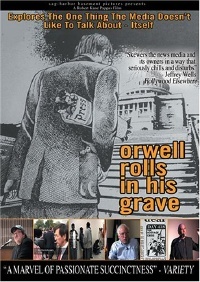 I guess we feel the air of election time approaching, so last night we re-watched Orwell Rolls in his Grave. Part of the flood of political documentaries that sprouted up after George Bush was, um, elected in 2000, it is one of my favorites of that genre. An all-encompassing movie, as its subject is the control of the media, media consolidation and the role that the modern media plays in the government. As the cover says, it explores what the media doesn’t want to talk about – Itself.
I guess we feel the air of election time approaching, so last night we re-watched Orwell Rolls in his Grave. Part of the flood of political documentaries that sprouted up after George Bush was, um, elected in 2000, it is one of my favorites of that genre. An all-encompassing movie, as its subject is the control of the media, media consolidation and the role that the modern media plays in the government. As the cover says, it explores what the media doesn’t want to talk about – Itself.
It is a serious documentary, being primarily just interviews, but these are interviews with some great folks: Charles Lewis (formerly of 60 Minutes), Mark Crispin Miller, Bernie Sanders, Greg Palast, Vincent Bugliosi and more! Filmmaker Robert Kane Pappas continually reminds us of the dangers of the national dialog being not just presented in the forms that they are, but with the control of that presentation in the hand of too few corporations whose agendas are more and more hand in hand with the government, rather than serving the public interest to inform us about the actions of the government and corporations.
The movie has extensive quotes from both Nineteen Eighty-Four and from Joseph Goebbels, I imagine in the hope of shocking the viewers in either awareness or an actual sense of caring about any of this. But the people who would watch this aren’t the people who need to see it. But would those people care anyway? Probably not.
Orwell Rolls in his Grave goes into the deregulation of the media, the removal of the fairness doctrine, the FCC lack of interest in the public good and the effects of all of those. It is scary stuff, rather aggravating with some great scenes… Especially the FCC committee hearing where they are planning on basically throwing out all ownership rules, hearing one board member make an extensive and intelligent argument against relaxing these rules, and then having another one make an terrible argument for it (against the first amendment rights of the corporations, and some chatter about media ownership limitations deny the citizens their right to choose?)… They also look at the power of the Media’s lobbyists in Washington (personally, I’m not ever sure why any lobbyists are allowed at all).
As with most of these films, it is frustrating and maddening, but also filled with though-provoking and valuable insights and it is all something that is good to keep in mind. And a reminder that though we are made to read Nineteen Eighty-Four in jr. high as (I imagine) some kind of warning, some of those kids took to it as a “how to succeed” guide.
